“Stop running the rat race, focus on what you have and build the better future that you are aspiring for.”
Ms Kalaiselvi
Founder, Aruvi Eco
Email: aruvieco@gmail.com
https://www.aruviorganics.com/
Alagu Niranjan, Bhuvana N and Ditty Maria Dominic recently explored the journey of Kalaiselvi, Founder, Aruvi Eco, to understand her inspiring journey as an agripreneur. Excerpts from this interview.
|
Aruvi Eco brings you organically grown produce sourced from local farmers committed to sustainability. They believe in the power of nature to nourish our bodies and promote wellness. They have a diverse range of products under various categories, such as amla delights, dip tea sensations, mango marvels, and tropical temptations. |
Please tell us about yourself and your background.
I was born and brought up in Tirupur. Since my school days, I used to spend my vacation at my aunt’s home in the village. Maybe because of that, I developed an interest in plants, trees and nature from a very young age. After summer vacation, when I returned home, even if I found a small bit of land, I would sow some seeds, plant some saplings, and water them every day after coming back from school. I got much happiness seeing them growing and bearing flowers and fruits. So, that was the way I grew up.
For higher education, I did BE in Computer Science, like others in my age group during the 2000s. After graduation, I started working, then I got married; later, I completed my MBA also. Life went on. For 10 years, I lived in the USA along with my husband and kids. Due to personal reasons, we decided to come back to India. In the meantime, my parents had moved to our village permanently.
Whenever we got holidays, my family and I used to come back to our village. Here, I must tell you about my father, a man very passionate about farming. I often think that I love agriculture very much maybe because of him. He worked very hard and converted our ancestral land which was coarse and barren into a green garden. He intelligently managed our farm by installing cameras and guiding laborers remotely, even while we were staying in the town far away from our village. From 1999 onwards he hasn’t even used one gram of chemical pesticides on our farm. Now our 10 acres of land holds 600-700 trees of different kinds – fruits such as mangos, sapota, guava, amla, etc.
Whenever I went home during holidays I worked right beside my parents in the farm. My father insisted that we (my sister and I) plant saplings, as he believed that we had green fingers and were lucky.
How did your family’s return to India lead to the discovery of your farm’s untapped potential?
Initially, we were in Chennai for a while after our return from the USA. During COVID-19, our whole family had to go live on our farm in the village. That was the turning point, where I got some insights about the potential of our farm’s productivity.
When I saw our farm’s fruits, which are completely free from any sort of chemicals, lying rotting on the field, I recollected the time where I myself was buying organic food items at high prices. For example, amla (Indian gooseberry), which is valued as a super-food worldwide, lay all over the ground going to waste. This was the condition even after asking our customers to take amla for free.
So, initially, I tried to utilize the unused amla by myself. I searched on Google and tried to make some hair oil for home use; that gave me some satisfaction. But 20-30 kgs of fruit going waste was distressing. That’s when my father gave me this idea of value addition.
We started thinking about it, as we had more time during COVID. But, getting proper training from good places was a big challenge at that time. So, Google became my primary source of information about value addition. I tried things through trial-and-error method. Little by little I made progress.
During September 2022, I formally registered our company, also involving our children as part of the firm. Subsequently, the company logo and labels were sorted out, then the products were laboratory tested.
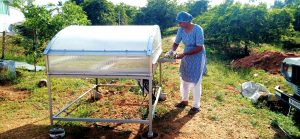 Drying the amla at the farm
Drying the amla at the farm
What are your main products?
As I was already experimenting with amla, I decided to start with the same fruit. I learnt that around 25 products can be made from amla and I shortlisted six products. The technical support for product development was initially provided by a food scientist at the Krishi Vigyan Kendra (KVK) in Pongalur.
Other than amla, I began developing other products such as Guava leaf-based tea, Amla Moringa soup mix, Jamun seed powder, Raw Mango Powder, Moringa Powder, Dip Teas/Soups and dried Sapota (chiku). I made use of all possible trees and plants and got good products out of it.
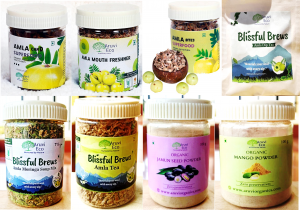 Different products from Aruvi Eco
Different products from Aruvi Eco
What role did trainings play in strengthening your enterprise?
Once the pandemic settled, I started connecting with various institutions – Tamil Nadu Agricultural University (TNAU), Coimbatore; National Institute of Food Technology Entrepreneurship and Management (NIFTEM), Thanjavur; and NGOs run by retired professors of TNAU. For the next two years, I invested all my time in training. I am a member of a few incubation forums, through which I get course and events related information. I also got business information through a program called PSG-Science & Technology Entrepreneurial Park (PSG Step). They help entrepreneurs to groom themselves.
After investing time in training, I personally decided not to use white sugar in my products, and used jaggery instead. Another decision which I made was not to add any kind of additives or preservatives to my products and hence the shelf-life of my products is relatively less, that is four months.
What is your view on business incubation?
Incubation centers are a great place to start for any aspiring entrepreneur. They provide all kinds of support to budding entrepreneurs. Most of the incubation centers have a standard set of training materials and/or training routine. But, for people like me, who want to do things a little differently, they don’t have customised information. They always promote standard solutions, but entrepreneurship is all about risk taking, isn’t it?
I can share one such experience. I needed the recipe for making amla candy with jaggery but in almost all trainings that I attended, they were giving the recipe that uses sugar as the ingredient. So, I met the trainer personally to know the details about proportion of jaggery to be added for preparing the candy. But they had no answer; maybe because they are not aware of it or they don’t want people to take risks. I am not sure, but I didn’t get any help in that regard. This increases my trial time as I am still learning about this area of product development.
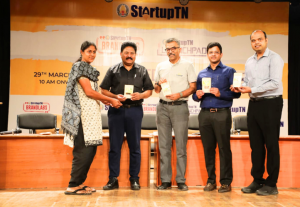 Unveiling Amla products at StartupTN
Unveiling Amla products at StartupTN
How did your digital marketing journey evolve, and what strategies proved successful?
For marketing, I started with a WhatsApp Status group, as I had a handful of people who had already tried my products. So, the products were officially launched on WhatsApp. For two months, the product was only marketed through WhatsApp. Then, we decided to expand our digital presence in Facebook and Instagram also. Thus far we personally maintain these pages.
Once I understood that my knowledge of digital marketing was limited, I started attending a lot of workshops related to digital marketing. As I am part of many groups, such as Startup India, I get these event alerts.
The major constraint I faced in digital marketing of my product was lack of time. I had to spend my entire time in developing and manufacturing products and thus could not spare any time for digital marketing initially. Therefore, I decided to partner with a company to market and promote our products on various platforms such as WhatsApp, Facebook Instagram, YouTube and LinkedIn. For B2B deals, I expanded my presence on LinkedIn. And in addition to these, we (my children and I) created a website and included a blog feature on our website. The idea of including Blogs on the website came through my learning from digital marketing courses. I learnt that people generally tend to use Google to ask any question that comes to their minds. So, we have started writing blogs on most frequently asked questions around our products and their ingredients. This way I am expecting to attract organic traffic to our website. Other than promotional activities, I actively seek feedback from our customers, especially the negative ones and suggestions for improving our products. And I use such feedback to improve our products.
Do you have a presence on e-commerce sites? Was it challenging to set up your store on these e-commerce sites?
Since January 2023, we have registered and listed our brand on Amazon (https://rb.gy/m53ec), Meesho, myStore, ONDC and Swiggy Mini. All our products are now available on our website (www.aruviorganics.com) as well.
From my understanding, anybody can set up a store on commerce sites. Their customer support will help anyone to set up and bring up their products there.
From what I have observed, a mere listing of products on e-commerce sites will not fetch new orders. We need to invest our time and money to promote our product catalog to attract new buyers. Product photography was another area that we never concentrated on before. With proper product images, description and listing, it is better to invest in paid promotions, which will build the initial customer base for our brand.
What other means did you use to promote your products?
Stalls in exhibitions played a big role in linking our products with various people. Once I met a person at an exhibition, he found my work interesting and requested to shoot our work as a video for posting in his YouTube Channel (Uzhavan Magan). He visited our farm and shot the video; when the video was out, it was a big leap for me ( http://y2u.be/bScs-ZvW3VQ ). I got lots of hits. That’s when I realized my target audiences are more on YouTube and Facebook, not on Instagram. I am also in Clubhouse, and I regularly listen to a program called Business over Breakfast (BOB).
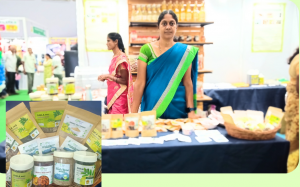 Exhibiting the products at an expo
Exhibiting the products at an expo
Are you getting support from any government schemes?
I have registered under Pradhan Mantri Formalisation of Micro food processing Enterprises (PMFME) scheme, through which I am planning to automate my production process. I came to know about this scheme from news articles and advertisements in the newspaper.
What are your future plans?
Next, I want to export all our products, but only after meeting all local demands. Soon, I would like to automate most of the work with our Amla-based products, as the products are already standardized. Meanwhile, I will be spending a considerable amount of time developing other innovative products. I wish to convert my whole manufacturing area into an industry-like environment where machines run throughout the day with one product or the other in the making. It should be a 24/7 working company. Employing more women and differently abled people is also in the pipeline.
What were the challenges you faced while establishing this business?
My entire family has been supporting me in this process, especially my father, without whom I would not have reached this far. Naturally, some of my acquaintances criticized me for choosing a farm-based business over a salaried job where I can sit in an AC room and earn. Such criticisms were disturbing, but I overcame it once recognition came in with the success of my venture.
What is your advice to fellow women entrepreneurs?
Having chemical-free and sugar-free products in hand, I am very hopeful about growing in the business. I know it is a really big challenge to handle everything at once with family, business, and all other things; but when it comes to prioritizing your vision one just must take strong decisions. Do not wait for the right time and do not consult too many people for advice because that is how you will get confused. Just follow your dream. You’ll definitely get there one day.
Acknowledgement: This interview was done as part of the IRRI-CRISP ongoing project ‘Mapping of Good Practices in Digital Innovations in India Supporting Women Agrientrepreneurs’.
 Alagu Niranjan D, is a Research Fellow at the Centre for Research on Innovation and Science Policy (CRISP), Hyderabad, Telangana, India. He can be reached at: dan131995@gmail.com
Alagu Niranjan D, is a Research Fellow at the Centre for Research on Innovation and Science Policy (CRISP), Hyderabad, Telangana, India. He can be reached at: dan131995@gmail.com
 Bhuvana N, is a Consultant at the Centre for Research on Innovation and Science Policy (CRISP), Hyderabad. She has a PhD in Agricultural Extension, from Professor Jayashankar Telangana State Agricultural University, Hyderabad. Her research interests include organizational ecosystems and effectiveness, social networks and technological change. She can be reached at: bhuvanaditya7@gmail.com
Bhuvana N, is a Consultant at the Centre for Research on Innovation and Science Policy (CRISP), Hyderabad. She has a PhD in Agricultural Extension, from Professor Jayashankar Telangana State Agricultural University, Hyderabad. Her research interests include organizational ecosystems and effectiveness, social networks and technological change. She can be reached at: bhuvanaditya7@gmail.com
 Ditty Maria Dominic, Research Fellow at Centre for Research on Innovation and Science Policy (CRISP), Hyderabad, Telangana, India. She can be reached at: ditty794@gmail.com
Ditty Maria Dominic, Research Fellow at Centre for Research on Innovation and Science Policy (CRISP), Hyderabad, Telangana, India. She can be reached at: ditty794@gmail.com

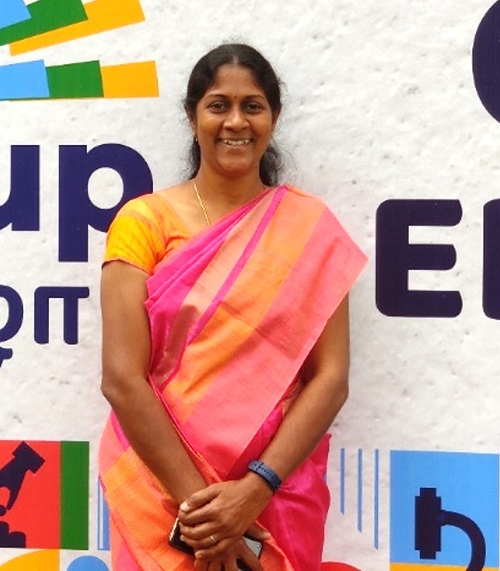



Add Comment